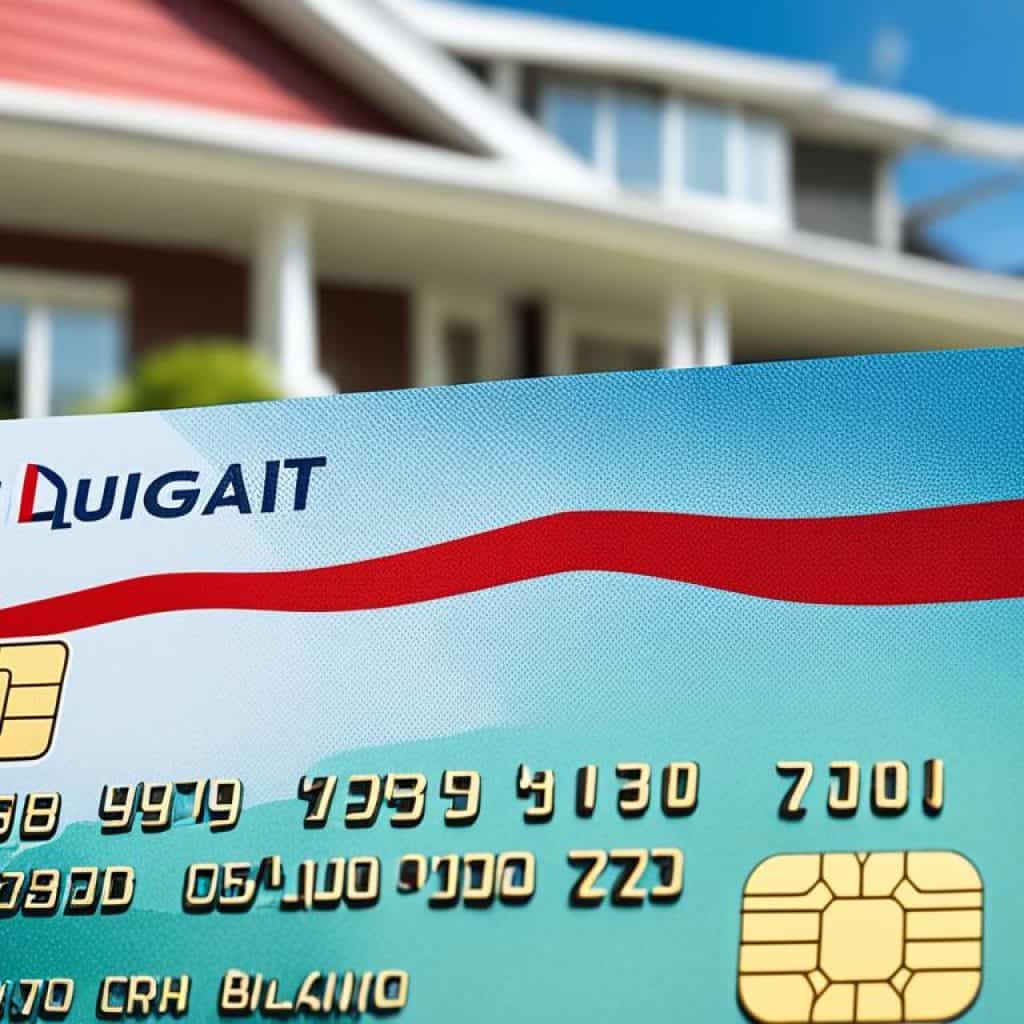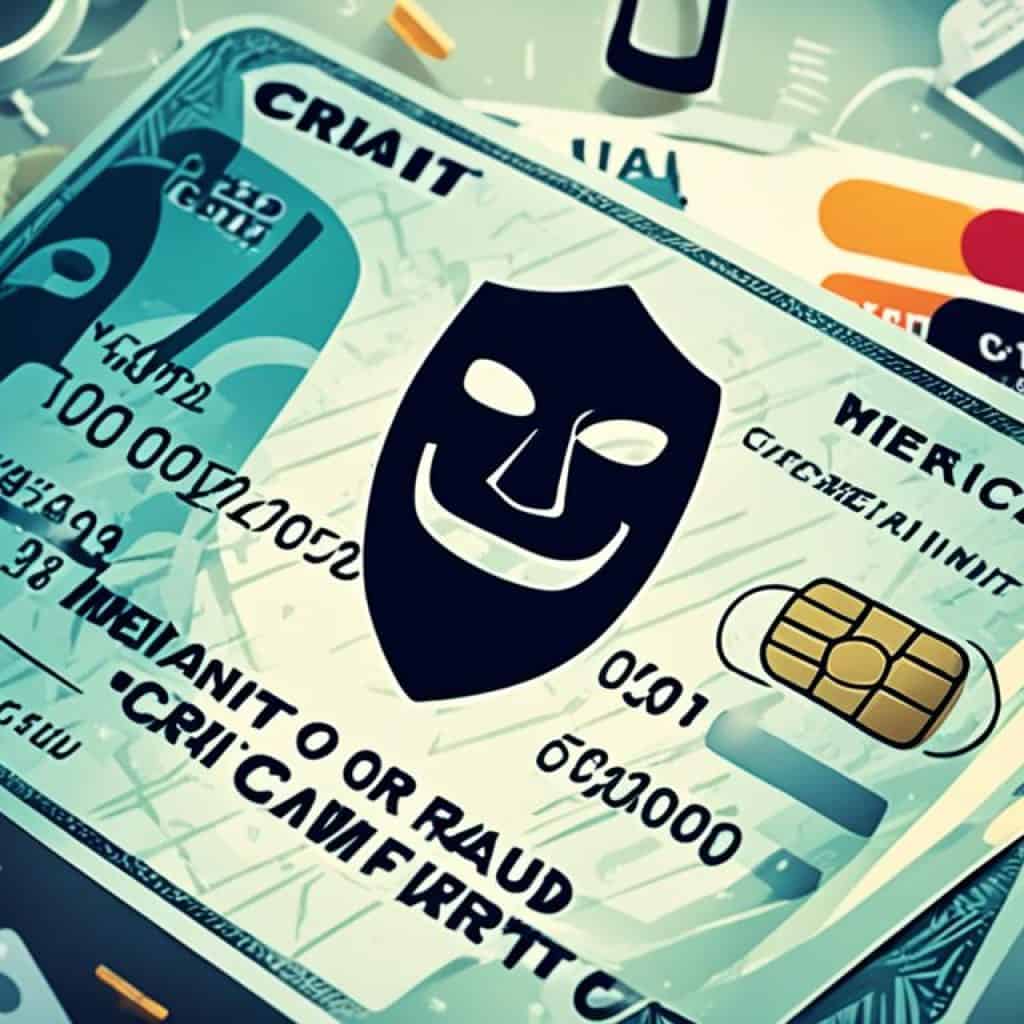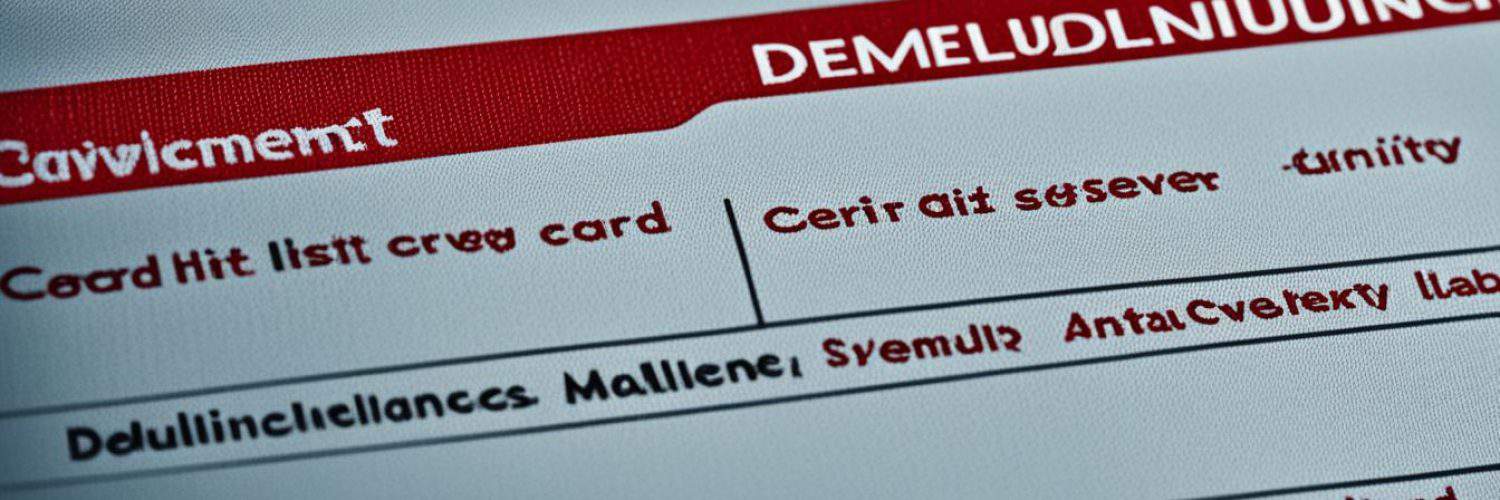Are you aware of the delinquent credit card holders list in the Philippines? Do you know who the credit card defaulters are and what their status is?
In the Philippines, credit card debt is a common issue faced by many Filipino cardholders. However, not all credit card users are delinquent or have outstanding debts. Understanding how credit card debt works and managing it properly is crucial to avoid becoming a delinquent credit card holder. By knowing the consequences of non-payment and the available options for handling credit card debt, Filipino cardholders can take proactive steps to maintain their financial well-being.
Key Takeaways:
- Many credit card users in the Philippines struggle with delinquency or overdue debts.
- Managing credit card debt responsibly is key to avoiding negative consequences.
- Understanding the available options for handling credit card debt is crucial.
- Being aware of the delinquent credit card holders list can shed light on the issue.
- Take proactive steps to maintain your financial well-being and avoid becoming a delinquent credit card holder.
How to Pay for Your Credit Card in the Philippines
As a Filipino credit card holder, you have multiple options for paying your credit card bills. Here are some convenient payment methods to ensure timely and hassle-free transactions:
1. Over-the-Counter Payment
Make over-the-counter payments at your credit card provider’s bank or authorized payment centers such as Bayad Center and Cebuana Lhuillier. Simply visit the nearest branch and present your credit card statement or account number to settle your dues.
2. ATM Payment
Use your own bank’s ATM or partner banks’ ATMs for seamless credit card bill payments. Just insert your credit card and follow the on-screen instructions to complete the transaction. Remember to keep the ATM receipt for reference.
3. Online Banking
Take advantage of the convenience of online banking by paying your credit card bills through your bank’s online portal or mobile app. Log in to your account, navigate to the credit card payment section, and follow the prompts to settle your outstanding balance.
4. Auto-Debit Arrangement
Simplify your credit card payments by setting up an auto-debit arrangement. This option allows your credit card bills to be automatically deducted from your deposit account on a specified date. Contact your bank to inquire about this service and provide the necessary details for seamless recurring payments.
5. E-Wallet Apps
In the digital age, e-wallet apps like GCash or Coins.ph offer a convenient and secure option for paying your credit card bills. Simply link your credit card to the e-wallet app and follow the instructions to make your payments seamlessly.
Choose the payment method that suits your preference and lifestyle, ensuring that you meet your credit card payment obligations on time. By staying diligent with your payments, you can maintain a good credit standing and avoid unnecessary penalties and fees.
Benefits of Paying Credit Card Debt on Time
Paying credit card debts on time brings several benefits. First, it helps improve the individual’s credit score, making it easier to apply for new financial products and obtain higher credit limits. Timely payments also avoid late fees and penalties, ensuring a good standing with the credit card issuer. By managing credit card debts responsibly, cardholders can maintain a positive financial reputation and gain access to better credit and loan opportunities.
Credit Score Improvement
When credit card debts are consistently paid on time, it reflects positively on the individual’s credit score. A higher credit score indicates responsible credit behavior and enhances the individual’s eligibility for future loans, mortgages, and other financial products. Lenders and financial institutions are more likely to approve credit applications from individuals with good credit scores, as it reduces the risk of non-payment.
Avoid Late Fees
By paying credit card debts on time, cardholders can avoid incurring late fees and penalties. Late fees can accumulate over time and add unnecessary financial burden to the outstanding balance. By making timely payments, cardholders can allocate their resources more effectively and avoid these additional costs.
Maintain Good Credit Standing
Consistently paying credit card debts on time not only improves the individual’s credit score but also helps maintain a good credit standing. This means that the cardholder is viewed favorably by credit card issuers, increasing the chances of obtaining credit limit increases and better terms. A good credit standing indicates responsible credit management and financial stability.
Managing credit card debts responsibly is essential for financial well-being. By paying debts on time, individuals can not only improve their credit score but also avoid late fees and penalties. Maintaining a good credit standing opens doors to better credit and loan opportunities. It is important to prioritize credit card debt payments and adopt healthy financial habits to achieve long-term financial stability.
| Benefits | Description |
|---|---|
| Improved Credit Score | Paying credit card debts on time leads to an improved credit score, enhancing eligibility for financial products. |
| Avoid Late Fees | Timely payments help cardholders avoid incurring late fees and penalties. |
| Maintain Good Credit Standing | Paying debts on time helps maintain a positive reputation and enhances creditworthiness. |
Consequences of Not Paying Credit Card Debt in the Philippines
Failing to pay credit card debts in the Philippines can have serious repercussions on your financial well-being. Accumulating credit card debt can lead to a negative credit score, making it more challenging to secure new credit cards, loans, or other financial products in the future.
When credit card debts go unpaid, it can result in limited financial transactions. Your credit card provider may restrict your access to credit, reducing your purchasing power and limiting your ability to make necessary transactions.
Furthermore, non-payment of credit card debts can lead to the involvement of debt collection agencies. These agencies are responsible for collecting outstanding debts on behalf of the credit card issuer. They may employ various strategies, including contacting you directly, sending collection letters, or even taking legal action to recover the unpaid debt. Dealing with debt collection agencies can be intimidating and may add additional stress to your financial situation.
To avoid these consequences, it is crucial to manage your credit card debts wisely. Make timely payments and strive to maintain a healthy credit score. If you are experiencing financial difficulties, consider seeking professional advice to help you navigate your options and develop a plan for debt repayment.
Notable Quote:
“Failure to pay credit card debts can have long-term consequences for your financial health, including a negative credit score and limited access to credit. It is essential to manage your debts responsibly to protect your financial well-being.”
Consequences of Not Paying Credit Card Debt in the Philippines:
| Consequences | Description |
|---|---|
| Accumulating Credit Card Debt | Unpaid credit card debt can accumulate over time, exacerbating your financial struggles and making it harder to repay the debt. |
| Negative Credit Score | Non-payment of credit card debt can lead to a negative impact on your credit score, making it more difficult to obtain credit in the future. |
| Limited Financial Transactions | Unpaid credit card debt may result in limited access to credit and restricted financial transactions, hindering your ability to make necessary purchases. |
| Debt Collection Agencies | Failure to pay credit card debt can result in the involvement of debt collection agencies, adding additional stress and complications to your financial situation. |
Managing your credit card debts responsibly is essential for maintaining a healthy financial status and avoiding the negative consequences associated with non-payment.
How to Deal with Debt Collection Agencies in the Philippines
If you find yourself in a situation where your credit card debt has been assigned to a debt collection agency in the Philippines, it is important to know your rights as a debtor and understand how to handle the situation. Debt collection practices in the country are regulated, and debt collectors are prohibited from engaging in unfair or abusive practices according to BSP Circular 454.
When dealing with debt collection agencies, it is crucial to document all interactions and communications with them. This documentation can serve as evidence in case you need to report any abusive practices. Additionally, it is advisable to report such practices to your credit card-issuing bank. They have a vested interest in ensuring that their customers are treated fairly and within the confines of the law.
Furthermore, safeguarding your personal information is of utmost importance. Be cautious about sharing sensitive details with debt collectors unless you are certain that they are legitimate and working on behalf of your credit card issuer.
By familiarizing yourself with the regulations surrounding debt collection practices in the Philippines, you can protect yourself from unjust treatment and ensure that you have the necessary tools to address any issues that may arise.
Credit Card Amnesty Program in Philippines
The Interbank Debt Relief Program (IDRP) in the Philippines is a voluntary initiative by the Credit Card Association of the Philippines (CCAP) aimed at assisting distressed credit cardholders in settling their debts with more favorable terms. This program provides an opportunity for debtors to restructure their credit card debts into a single loan with lower interest rates and extended repayment periods. It offers a more manageable way to repay debts and alleviate financial burdens for eligible credit cardholders.
Key Features of the Interbank Debt Relief Program:
| Benefits | Description |
|---|---|
| Debt Restructuring | Qualified credit cardholders can consolidate their debts into a single loan, simplifying repayment. |
| Lower Interest Rates | The IDRP offers lower interest rates, reducing the overall cost of repaying the credit card debts. |
| Extended Repayment Periods | Eligible debtors can extend their repayment periods, providing more time to settle their debts without financial strain. |
| Affordable Debt Repayment | The program aims to make debt repayment more affordable by adjusting the monthly amortization based on the debtor’s income and expenses. |
This amnesty program is designed to provide relief to individuals burdened with credit card debts, assisting them in achieving a fresh start and working towards a debt-free future. Eligible credit cardholders are encouraged to contact their respective banks to inquire about the Interbank Debt Relief Program and initiate the application process.
Benefits of Restructured Credit Card Debt
Restructuring credit card debts through the Interbank Debt Relief Program (IDRP) offers several benefits to eligible credit cardholders. With the IDRP, debtors can enjoy lower interest rates, longer repayment periods, affordable monthly amortization, and a reduced credit limit.
Lower Interest Rates: The IDRP provides a favorable interest rate on the consolidated debt, reducing the total cost of repayment. This allows credit cardholders to save money and make their payments more manageable.
Longer Repayment Periods: Debtors approved for the IDRP can extend their repayment periods for up to ten years, depending on their specific case. This extended timeline gives borrowers the flexibility to spread out their payments and reduce the financial strain.
Affordable Monthly Amortization: The IDRP calculates the monthly amortization based on the debtor’s income and expenses. This ensures that the monthly payment is within the individual’s capacity to pay, making the repayment process more affordable and sustainable.
Reduced Credit Limit: Upon approval of the IDRP, the debtor’s credit limit is reduced to zero, and their credit cards are blocked or canceled. This prevents further usage of the credit cards and encourages responsible financial habits.

By taking advantage of the IDRP, eligible credit cardholders can enjoy these benefits and regain control of their financial situation. It offers a structured and manageable approach to repaying credit card debts, paving the way to a debt-free future.
Banks Offering Credit Card Amnesty Program in the Philippines
The Interbank Debt Relief Program (IDRP) is available to credit cardholders of participating banks, providing them with an opportunity to settle their debts more favorably. The IDRP is offered by various credit card issuers in the Philippines, including Bank of Commerce, Bank of the Philippine Islands, BDO Unibank, China Banking Corporation, Citibank, EastWest Bank, Equicom Savings Bank, HSBC, Maybank, and others.
To be eligible for the IDRP, credit cardholders must meet specific criteria. They should have an outstanding balance of at least PHP 10,000 per card and a total overdue balance of PHP 100,000. It is important to reach out to the respective bank to inquire about their specific credit card amnesty program for delinquent accounts. Each bank may have slight variations in eligibility requirements and program details.
If you are a credit cardholder with one of the participating banks and find yourself burdened by credit card debt, it is worth exploring the IDRP to restructure your debts and ease your financial obligations. Contact your credit card issuer today to learn more about the IDRP and how it can help you regain control of your finances.
Applying for Credit Card Amnesty in the Philippines
Applying for credit card amnesty through the Interbank Debt Relief Program (IDRP) in the Philippines is a straightforward process. Eligible credit cardholders can take advantage of this program to restructure their debts and find a more manageable way to repay them. To begin the application process, there are specific requirements that must be met, and certain documents need to be prepared.
Eligibility Requirements
- Must be a Filipino credit cardholder
- Should have at least one credit card from different participating banks
- Outstanding balance of at least PHP 10,000 per card
- Total overdue balance of PHP 100,000
It is important to note that these eligibility requirements may vary depending on the participating bank. Thus, it is advisable to contact the respective bank directly to confirm the specific criteria.
Required Documents
- Completed application form
- Valid identification (such as a government-issued ID or passport)
- Income statements (proof of income, such as pay slips or tax returns)
- IDRP Payment Agreement Contract
These required documents ensure that the necessary information is provided and help facilitate the application process. By submitting these documents, credit cardholders can move forward with their credit card amnesty application.
It is essential to reach out to the respective bank and follow their specific application process to ensure accuracy and completeness. By doing so, credit cardholders can avail themselves of the benefits of the IDRP and find a path towards resolving their credit card debts.
Handling Credit Card Debt Collectors in the Philippines
Dealing with credit card debt collectors in the Philippines requires a sound understanding of collection practices and the rights of debtors. As a debtor, you have the right to be free from threats, harassment, false or misleading representations, and the disclosure of personal information without your consent. It is important to know and protect your rights during debt collection proceedings.
Non-cooperation with debt collectors could potentially result in negative listings in the Credit Management Association of the Philippines (CMAP). These listings can make future financial transactions more challenging for you. Therefore, it is advisable to explore negotiation and debt restructuring options to resolve your debt issues before legal actions are pursued.
Remember, protecting your rights and understanding your options is key to effectively handling credit card debt collectors in the Philippines.
To assist you in navigating this process, here are some important considerations:
1. Collection Practices
Debt collectors must adhere to specific collection practices outlined by regulatory authorities. These practices prohibit debt collectors from engaging in abusive or unfair conduct, ensuring a fair debt collection process. If you believe that a debt collector has violated these practices, you have the right to report their actions and seek appropriate action.
2. Rights of Debtors
As a debtor, you have certain rights that protect you during the debt collection process. These rights include the right to be treated with respect, the right to receive accurate information regarding your debt, and the right to dispute any debt that you believe is incorrect or invalid. Familiarize yourself with these rights to ensure that debt collectors are acting within the boundaries of the law.
3. CMAP Listing
The Credit Management Association of the Philippines (CMAP) is a central source that records the creditworthiness of individuals. Failure to cooperate with debt collectors may lead to negative listings on your CMAP record. These listings can have a significant impact on your ability to access credit or loans in the future. It is important to address your debt obligations proactively to avoid negative CMAP listings.
4. Negotiation and Restructuring
Prior to pursuing legal actions, explore negotiation and debt restructuring options. Negotiating with your credit card issuer or debt collector can potentially lead to a mutually agreeable repayment plan that suits your financial circumstances. Debt restructuring programs, such as the Interbank Debt Relief Program (IDRP), may offer more manageable terms and conditions for repaying your debt.
Debt Collection Best Practices in the Philippines
| Best Practices | Description |
|---|---|
| Respectful Communication | Debt collectors should communicate with debtors respectfully and professionally, without using threats or abusive language. |
| Verification of Debts | Debt collectors should provide debtors with accurate and verified information regarding their outstanding debts upon request. |
| Dispute Resolution | Debtors have the right to dispute the validity or accuracy of a debt. Debt collectors should provide information on how to dispute debts and address any concerns raised by debtors. |
| Confidentiality | Debt collectors should handle debtors’ personal information with utmost confidentiality, ensuring that it is not disclosed to unauthorized parties. |
| Fair and Ethical Conduct | Debt collectors should comply with local laws and regulations governing debt collection practices, acting ethically and fairly in all their interactions with debtors. |

Legal Consequences of Credit Card Default in the Philippines
Defaulting on credit card debts in the Philippines can have serious legal implications. When a credit card debt remains unpaid, the credit card issuer may resort to filing a civil case for the collection of the outstanding balance. This legal action seeks to recover the debt by enforcing the court’s judgment.
If the debtor fails to comply with the court’s order to repay the debt, further consequences may follow. In some cases, the credit card issuer may seek to seize the debtor’s property or garnish their income to satisfy the outstanding balance.
It’s essential to note that defaulting on credit card debts can also result in the imposition of legal fees and costs on the debtor. These additional expenses can further aggravate the debtor’s financial burden.
Moreover, the repercussions of credit card default extend beyond the legal realm. Defaulting on credit card debts can significantly impact an individual’s credit history and reputation. The failure to meet financial obligations may result in a negative credit rating, making it more challenging to obtain credit or loans in the future.
Credit Card Default: A Looming Trail of Consequences
“Defaulting on credit card debts is not merely a financial matter but can have lasting ramifications on one’s overall financial health and reputation.”
When individuals default on their credit card debts, they inadvertently jeopardize their financial stability. The legal consequences, including civil cases for collection and associated fees, as well as the negative impact on credit history and reputation, should serve as a strong motivation to prioritize financial obligations and strive to maintain a strong credit standing.
| Legal Consequences of Credit Card Default | Effects |
|---|---|
| Civil Case for Collection | Enforcement of court judgment for debt repayment |
| Legal Fees and Costs | Additional expenses imposed on the debtor |
| Credit History and Reputation | Negative impact on credit rating and future credit opportunities |
Taking a proactive approach to credit card debt management is crucial to avoid the legal and financial consequences of defaulting. By seeking assistance, exploring debt repayment options, and prioritizing responsible financial practices, individuals can regain control of their finances and protect their credit history and reputation.
Credit Card Debt and Criminal Offenses in the Philippines
Non-payment of credit card debt is not considered a criminal offense in the Philippines. It is considered a civil liability, and the consequences are dealt with through civil actions. However, engaging in fraudulent activities related to credit card use, such as using forged or stolen cards or intentionally incurring debt without sufficient funds, can be considered a criminal offense under the Access Devices Regulation Act of the Philippines. It is essential to understand the distinction between non-payment and fraudulent activities when it comes to credit card debts.

| Type of Offense | Consequences |
|---|---|
| Non-Payment of Credit Card Debt | Civil liability |
| Fraudulent Activities (e.g., using forged or stolen cards) | Criminal offense under the Access Devices Regulation Act |
Rights and Protections for Debtors in the Philippines
Debtors in the Philippines are granted essential rights and protections to safeguard them against unfair debt collection practices. These rights are established under the guidelines and regulations provided by BSP Circular 454, which aims to prevent debt collection agencies from engaging in abusive or deceptive practices. It is crucial for debtors to be aware of their rights and take necessary actions to protect themselves.
One of the key rights for debtors is the ability to document any instances of abuse or unfairness they experience during the debt collection process. By maintaining detailed records of interactions, debtors can provide evidence if needed. Moreover, debtors should be proactive in reporting any abusive practices to their credit card-issuing bank. This ensures that appropriate measures can be taken to address the situation and prevent further harm.
It is essential for debtors to understand their rights under BSP Circular 454, as it empowers them to actively protect themselves. By knowing the regulations surrounding debt collection, debtors can identify and report any violations, enabling the authorities to take necessary actions against unfair practices.
“Debtors should be aware that they have rights and should not hesitate to report any abuses or unfair practices they encounter. It is crucial to document interactions and provide evidence to the credit card-issuing bank.”
Key Rights for Debtors
- Protection against abusive or deceptive debt collection practices
- Right to document instances of abuse or unfairness
- Ability to report abusive practices to credit card-issuing bank
By exercising these rights, debtors can actively participate in the debt collection process and prevent potential harm. BSP Circular 454 serves as a valuable tool for protecting debtors in the Philippines, ensuring fair and ethical practices are followed by debt collection agencies.
Reporting Abuses and Unfair Practices
If debtors encounter any violations of their rights or unfair practices, it is crucial to take appropriate action. Here are the steps debtors can follow:
- Document all instances of abuse or unfairness, including dates, times, and details of the interactions.
- Contact the credit card-issuing bank and report the abusive practices experienced.
- Provide the credit card-issuing bank with the documented evidence to support the complaint.
- Cooperate with any investigation initiated by the bank or regulatory authorities.
By reporting abuses and unfair practices, debtors play a crucial role in holding debt collection agencies accountable, thereby protecting themselves and other individuals facing similar situations. Together, debtors and regulatory authorities can work towards ensuring a fair and ethical debt collection process in the Philippines.
Rights and Protections for Debtors
| Rights and Protections | Description |
|---|---|
| Protection against abusive practices | Debtors have the right to be free from threats, harassment, false or misleading representations, or disclosure of personal information without consent. |
| Documentation of abuse or unfairness | Debtors can keep records of interactions and document instances of abuse or unfairness. This evidence can be used to support complaints or investigations. |
| Reporting to credit card-issuing bank | Debtors should report abusive practices to their credit card-issuing bank and provide them with the necessary evidence to support their complaint. |
| Cooperation with investigations | Debtors should cooperate with any investigation initiated by the credit card-issuing bank or regulatory authorities to address the abusive practices. |
Seeking Financial Advice and Debt Management in the Philippines
If an individual is struggling with credit card debt in the Philippines, seeking professional financial advice can be the key to finding a path towards financial freedom. A Financial Advisor can provide expert guidance on various aspects of debt management, including debt restructuring, negotiation strategies, and responsible debt management.
A responsible debt management plan begins with assessing one’s financial situation to gain a clear understanding of the debt and all associated expenses. This evaluation helps create a realistic budget, ensuring that financial resources are allocated efficiently towards debt repayment. By prioritizing debt payments, individuals can take control of their finances and gradually reduce their credit card debt burden.
Seeking the assistance of a Financial Advisor can make a significant difference in managing credit card debt and achieving financial stability. They can provide personalized guidance based on an individual’s unique circumstances, helping to explore debt restructuring options that fit their needs and financial goals.
Debt restructuring can be an effective strategy for individuals struggling with credit card debt. It involves renegotiating loan terms with creditors to establish a more manageable repayment plan. This process often includes lowering interest rates, extending the repayment period, or consolidating multiple debts into a single loan. A skilled Financial Advisor can guide individuals through the complex negotiation process, increasing the chances of reaching a favorable agreement with credit card issuers.
Responsible debt management also requires individuals to develop healthy financial habits and practices. This includes cultivating an awareness of spending patterns, exercising discipline in adhering to the budget, and being diligent with debt payment deadlines. By making consistent efforts towards responsible debt management, individuals can establish a strong foundation for their financial future.
Benefits of Seeking Financial Advice and Responsible Debt Management:
- Expert guidance from a Financial Advisor
- Assistance with debt restructuring and negotiation
- Creation of a realistic budget
- Opportunity to prioritize debt repayment
- Potential for lower interest rates and extended repayment terms
- Development of healthy financial habits
Take the First Step Towards Financial Freedom
By taking advantage of the services provided by a knowledgeable Financial Advisor, individuals struggling with credit card debt in the Philippines can gain valuable insights and assistance in their journey towards financial freedom. Remember, responsible debt management is not only about reducing debt but also about cultivating healthy financial habits for long-term stability.
| Benefits of Seeking Financial Advice and Responsible Debt Management: |
|---|
| Expert guidance from a Financial Advisor |
| Assistance with debt restructuring and negotiation |
| Creation of a realistic budget |
| Opportunity to prioritize debt repayment |
| Potential for lower interest rates and extended repayment terms |
| Development of healthy financial habits |
Conclusion
Managing credit card debt in the Philippines is crucial for maintaining financial well-being. By understanding the consequences of non-payment, available payment methods, and debt relief programs like the Interbank Debt Relief Program (IDRP), individuals can take proactive steps to handle credit card debts responsibly. It is important to seek professional advice if needed and constantly reassess one’s financial situation to ensure a sustainable and debt-free future.
To effectively manage credit card debt, Filipino cardholders should prioritize timely payments to avoid negative credit score impact and late fees. Making use of convenient payment options such as over-the-counter, ATM, online banking, or auto-debit arrangements can ensure bills are settled securely and on time. By paying credit card debts promptly, individuals can improve their credit score, maintain a positive credit standing, and gain better access to credit and loan opportunities.
For those facing difficulties in repaying credit card debts, the IDRP provides a viable solution. This program allows eligible credit cardholders to restructure their debts with lower interest rates and longer repayment periods. By availing this opportunity, debtors can reduce their monthly amortization and alleviate financial burdens. It is crucial to reach out to participating banks to inquire about their specific credit card amnesty programs and fulfill the eligibility criteria.
In conclusion, by managing credit card debt responsibly, Filipino cardholders can safeguard their financial well-being. Through timely payments, actively seeking professional advice, and exploring debt relief options, individuals can regain control over their finances and work towards a sustainable and debt-free future. Taking proactive steps to manage credit card debt is key to achieving financial stability and peace of mind.














Add comment